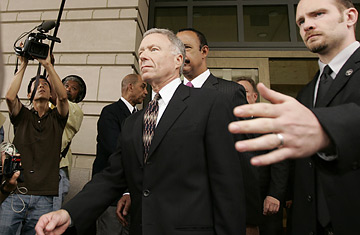
Lewis "Scooter" Libby leaves the courthouse after being sentenced to 30 months in prison and fined $250,000 for his role in the CIA leak case in Washington, June 5, 2007.
When I. Lewis "Scooter" Libby was sentenced Tuesday to a surprisingly long term of 30 months in prison for perjury and obstruction of justice, he became a victim of one of the most troubling aspects of federal sentencing laws — allowing harsher sentences for a crime that was never actually proven.
United States District Judge Reggie Walton sentenced Libby, Vice President Dick Cheney's former chief of staff, following his conviction in March of lying to federal investigators about leaking the identity of CIA operative Valerie Plame. Libby was also fined $250,000. He will appeal the punishment, though Walton will not decide until next week whether to allow Libby to remain free during the appeal or send him to prison almost immediately. President Bush has said he will not address the issue of a pardon for Libby at least until the appeals process is exhausted.
404 Not Found
The leak was the key issue for most Americans, the crux of an apparent White House campaign to discredit Plame's husband, Joseph Wilson, who wrote a 2003 op-ed piece debunking WMD justifications for the Iraq war. But while outing a CIA agent can be illegal, neither Libby nor anyone else was actually charged with doing that to Plame. In fact, pre-trial maneuvering found the prosecutor, Patrick Fitzgerald, insisting that this was not a case about a leak and fighting defense requests for documents about whether Plame was ever a covert agent, a status that could have made intentionally leaking her identity a crime.
But when the issue of sentencing came around, Fitzgerald changed his tune, arguing that the underlying (and uncharged) crime was so serious as to warrant a sentence twice as long as what the federal probation office recommended; notably, his brief included the revelation that the CIA did consider Plame's identity classified, at least for 18 months. And Tuesday, Walton apparently bought it, declaring before he announced the sentence that Libby could be considered an accessory to the underlying crime because, at least in part, his obstruction of justice made it all but impossible for the government to make the case for that crime.
So how is it that an offense that may never have happened — and that at one point the prosecutor argued was largely irrelevant to the case — has now increased Libby's criminal sentence?
It's part of the magic of the federal sentencing guidelines, which were mandatory until two years ago. The controversial rules prescribe penalties that can be raised or lowered within a range, depending on various factors. One factor in a perjury case is the severity of the crime originally being investigated. It's part of a general category of things — from particularly depraved conduct to the use of a weapon — that can, depending on the crime, increase a sentence if the judge determines by a preponderance of the evidence (the law's lowest level of proof) that they happened. To get a sense of the absurdity of this, think of someone found guilty beyond a reasonable doubt — the highest level of proof — of dealing 20 grams of cocaine, and the judge saying, hey, there's evidence that you dealt 10 times that amount, so you get an extra eight years.
The U.S. Supreme Court is well aware that enhancing sentences this way can be unfair, and the justices have struggled with it since 2000. That's when the court ruled 5-4 in Apprendi v. New Jersey that a New Jersey man's 10-year sentence (the maximum under state law) for shooting at a black neighbor's house could not be increased by two years just because the judge believed the crime was racially motivated. Unless the facts leading to the sentence are determined by a jury (or admitted to in a guilty plea), the court said, a judge required to impose a sentence longer than "the prescribed statutory maximum" violates the defendant's Sixth Amendment right to a jury trial.
The Supreme Court returned to the issue four years later in Blakely v. Washington. This time, the justices decided, also by a 5-4 vote, that Washington State's sentencing rules violated a kidnapper's Sixth Amendment right. Since the judge determined that the kidnapper had acted with "deliberate cruelty," the rules allowed the judge to add 37 months to the 53-month sentence. Even though 53 months was far below the "statutory maximum" of 10 years, the sentence was still unconstitutional, a conclusion that suggested the federal guidelines, which operated in a similar way, were in jeopardy.
In January 2005, the high court finally gave an answer: enhancements required by the federal guidelines also violate the right to a jury trial, but the constitutional fix is to make the guidelines optional. So a judge can use his traditional discretion to determine sentences, while consulting the guidelines, and so long as the sentences are reasonable, they won't violate the Sixth Amendment.
The betting before Tuesday was that Walton would not use that discretion to give Libby such a long sentence, since in doing so, he would be giving too much weight to a mere suspicion of the underlying, unproven crime. But as Libby's sentence proved, in today's criminal justice system, all such bets are off.
